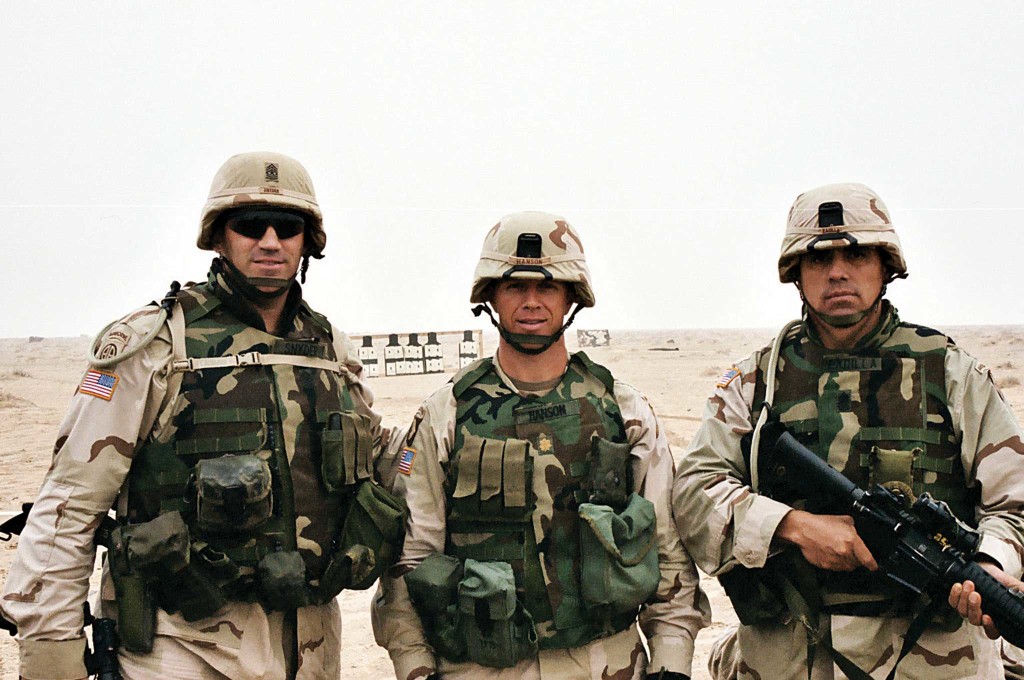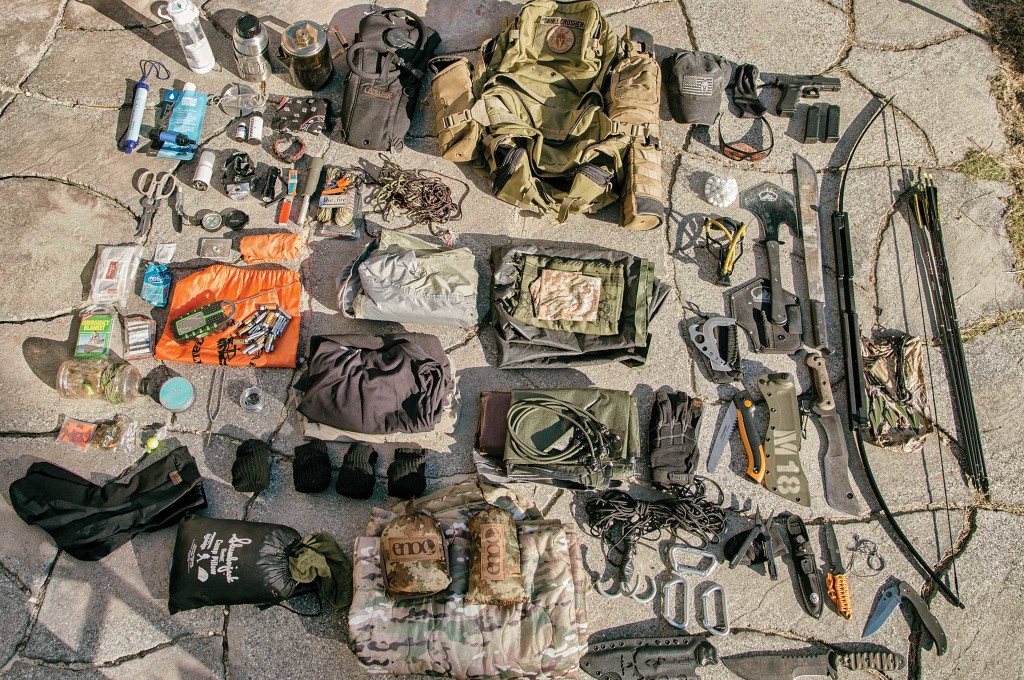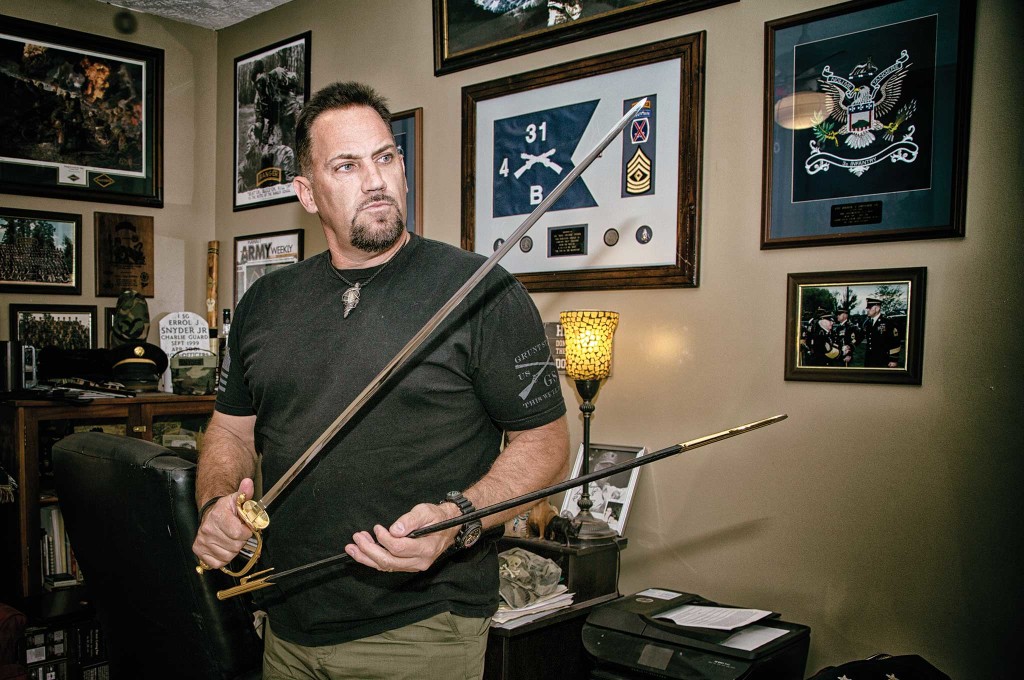RECOIL OFFGRID Survival How E.J. Snyder Paved a Road to Survivalist Success
The Survival TV trend only skims the surface of what goes into making a true survivalist. Some may view preppers as crazy people waiting for unimaginable events. But, this attitude overlooks the benefits that a survival-focused mindset can bring to one's everyday life.
E.J. Snyder is a prime example of how life rarely goes as planned. Snyder found his purpose in life through a unique combination of hardship and opportunity; each pulling him a little further down the path of the survivalist. Snyder sees his experiences as individual scenes which, joined together, form a rich tapestry he uses to motivate and educate others. From getting bullied as a kid to learning his role as a leader in the military to his naked butt gracing the TVs of millions, Snyder gleans valuable lessons from every experience.
When Snyder was approached for Discovery Channel's Naked and Afraid, the show's name was a working title. The producers whittled away elements of the show until the premise was based on surviving the toughest environments with no food or clothes for 21 days. Each episode runs a similar course; participants get eaten alive by the local bugs and nearly starve to death, and one person often quits before the last day. Snyder has been on two of the 21-day versions of Naked and Afraid, as well as the extended 40-day Naked and Afraid XL. Most people recognize Snyder as the naked guy who will go to any lengths to survive. But, behind the titles and accomplishments is a man who wants to help the masses.

We caught up with Snyder in North Carolina to see what he has learned along the way and listen to some of the advice he gives his students to build their self-confidence.
RECOIL OFFGRID: How do you define survival?
E.J. SNYDER: If you do something and don't die- that's called survival. No survival technique or skill was ever in a survival book until somebody tried it. And it's trial and error until you succeed and then it becomes a viable technique in a book.
What started you on your path as a survivalist?
EJS: My mom worked three jobs to take care of me and my brother, but we didn't have the nicest things. I got bullied a lot because I didn't have the nicest clothes. My mother's work ethic rubbed off on me and I picked up a paper route so I could buy school clothes for me and my kid brother. She taught me hard work and discipline and to not rely on others. The other side of that was my love for the outdoors began when my dad would pick us up on the weekends. He'd take us camping, fishing, canoeing, hunting, and trapping. When the weekend was over, I still wanted to be outside.
Bullying is a topic you feel strongly about, how did you handle bullies as a kid?
EJS: Back then, I wasn't the Skullcrusher, I was more of a stick snapper. I was very tall, lanky, skinny, and very emotional over my folks divorcing. And, when there's blood in the water, animals smell it- bullies are no different. So, I got targeted by a pack of bullies. But, I never fought back because I always thought I would get in trouble and get kicked out of school. My mom told me if those kids hit me, I had the right to defend myself. By this point, my stepdad was in my life and he taught me how to box and lift weights. I was learning wrestling in school and enjoyed the thrill of competition. I picked up more fighting techniques from friends who were taking karate. Learning to protect myself helped build my confidence. Finally I had enough and after being shoved by one of the biggest bullies, I defended myself. That was in sixth grade.
How did that shape your view of the world?
EJS: Bullies were one of the building blocks in my life. They helped me realize that if someone put up a challenge, or a wall so to speak, if I can't get around, over, or under it, I'm going to go right through it with passion, vigor, and as much energy as possible.
Why did you decide to go into the Army?
EJS: My mom asked me what I wanted to do with my life. I told her I wanted to be a stuntman and an actor. She said, ‘That's stupid, you'll never make it- that's the worst idea you could ever think of. You'll starve.' So, I decided to pursue my other dream, which was to join the military and live a life of adventure.
You held several leadership roles while in the Army, what kind of leader were you?
EJS: I was a lead-from-the-front, lead-by-example kind of guy. I would get in your face when you needed it, but I'd be there to put my arm around you when you needed it most. Everyone knew I was a passionate leader, and they would to follow me through the gates of hell, even though I was hard on them. I have that philosophy that more sweat in training means less blood in battle. The train as you fight mentality is something I adapted and put realism into training so that when people needed those skills most they'd have them. And if you fast-forward slightly, I used that same analogy —and the same philosophy— for the survival students I trained.

Snyder (left) in Kirkuk, Iraq with Major James Hansen and Command Seargent Major Arthur Padilla in 2004, providing...
When did the crossover from a military mentality to a more survivalist mindset happen?
EJS: After my time as a Drill Sergeant, I went on to be a Ranger instructor and while I was there, I was assigned as a primary survival and tracking instructor. Learning and teaching survival skills in the Army advanced some of what I had learned in my youth. The Army gave me more opportunities to be in the wilderness and outdoors. But, the biggest thrill was going through SERE level-C and then revamping the survival training program. That is when survival became my passion and my whole drive.
At what point in your life did you realize you had to be prepared for unexpected events?
EJS: When everyone started talking about Y2K and what could happen, I wanted to be prepared to take care of my family. I always had outdoor skills, but with Y2K, new skills became my hobby and my passion. While people were out doing other things, I was prepping for something that could affect my family- that was a pivotal point for me.
What initially motivated you to go on Naked and Afraid?
EJS: After retiring, I was in a kind of a low point in my life… just not happy with my career and not sure what I wanted in my life. When I'm out in the wild, I hear God's voice, loud. I thought I was going out there to do something really cool… do the survival thing, be a badass. And, I got so much more out of it. I was really humbled by that experience, in Tanzania. I was a changed man when I left. I evolved as a survivalist, became a changed man, and was closer to God after that point and really appreciated those things in my life that I was maybe taking for granted.
Naked and Afraid seems tough to prepare for.
EJS: I practice and I train that way all the time. So, when I was put into those situations, I didn't really do much to prepare, unless I knew I was going to a certain zone. If I know where I'm going, I may brush up a little bit on that particular area and the indigenous people that lived there. But for the most part I believe I can go anywhere on this planet with just my knife.
Did the Naked and Afraid experience impact other parts of your life?
EJS: It really refocused me on my path. It wasn't until I almost lost my life out there that I realized what I needed to do. I was meant to be a leader, to teach survival and help those that can't help themselves. When bad days come, I want to help people get through that. And so, I sit here before you.
What did you learn from being on the show?
EJS: From my first partner, I learned that it's okay to ask for help. The second time I went on the show, I tapped into my Native-American spirit and let the wild teach me some things. Getting back to my Native-American roots opened up something very primal. After being humbled by the first Naked and Afraid, I started shoring up my weaknesses. Instead of a military modern-day survivalist, I became more of a hybrid by tapping into primitive bushcraft while pairing it with my modern day survival techniques. Those experiences made me want to become more self-reliant- more off grid. I eventually want to get off the grid and have my own homestead.
Which situation has tested your mental fortitude the most?
EJS: It was a time when I felt the most helpless I've ever felt. While trying to get to the extraction point in the Amazon, in the middle of the night, while paddling in the river, a biblical storm hit. I knew lightning hit the water because the static electricity was raising the hair on the back of my neck and arms. I knew that was a dangerous situation; we had to get off of water or were going to be done. It was pitch black, we had no illumination, no moonlight. We pulled over to the side, with no idea of what we were walking into, knowing that black caiman [crocodiles] could be everywhere. We hunkered down against a tree, but got pummeled by the storm for five hours. I've never been close to hypothermia my life. We got to a point where we were both speaking in tongues, that I knew we had to get up and get moving or we weren't going to make it. So, we got back to paddling towards the extraction point. I have never felt so helpless knowing that because of the lightning, I just had to take it. So, in regard to mental fortitude, I got pretty close to my breaking point in that situation. I don't get there often.
How do you plan to go off grid?
EJS: I look at survival as a five-tier kind of thing. Those tiers include:
What kind of feedback have you gotten from being on survival shows?
EJS: People reached out to let me know how I inspired them. Some people said when they see me go through these tough challenges and get through it make it, that it causes them to make an adjustment in their lives for the better. Whether it's getting up off the couch or finally getting to the gym, getting out of a really bad relationship, getting bullied in school, or even overcoming addictions. If me being on TV drinking elephant dung, running around bare-naked with my butt hanging out helps just one person, then, for me, it's worth it.

Contrary to a bug out bag, the contents of Snyder's long-term survival nomad pack have enough supplies and gear...
What's your EDC?
EJS: Well I am a firm believer that you don't advertise what you're bringing to the table. So, I always walk around with a small bag. It's not a man purse or anything like that, it's just a small bag. I have enough stuff in the bag that would at least get me back to my vehicle, or if I have to walk home, I can get home. On my body it's a pretty extensive kind of situation. But, in terms of defense, I carry a Glock 22 with three magazines. I also carry a Spyderco Tatanka. One reason I usually wear eye pro is if I'm walking down the street nobody's can tell what I'm observing, and that gives me the ability to look and watch others while they don't realize I'm watching them. My belt is a Wazoo Cache Belt. On the belt is a D-ring attachment that will hold my weight if I was caught in a pinch and needed to be able to rappel down from something. It carries a couple handcuff keys, lockpicks, a wire saw, a razorblade, duct tape in there. Also some matches, 550 cord, small tools and a handful of cash, as well.
That's quite a bit of gear to carry every day.
EJS: It goes back to that philosophy. I don't know when that bad situation could happen, but I want to be a positive factor when it does. When I can carry more, I carry a basic survival kit, a fire starter, a water bottle with a built-in filter system, extra 550 cord, compass, a headlamp, flashlight, and SAPI [bulletproof armor] plate in case of an active shooter situation. Some people might say I'm a little off. But, I've walked to a different drum-beat my whole life.
If you were restricted to carrying only five items, what'd they be?
EJS: Number one item, my fixed-blade knife. My knife broke in Africa and because of that I created and designed my own survival fighting knife. It's a one-tool option, the SXB Skull Crusher Extreme Blade, by TOPS Knives. Number two, a magnesium fire starter because primitive fire making is actually very difficult, and it sucks. So why do it if you don't have to. Number three, a pot to boil water. I personally like using a Coleman camp coffee pot because it has a lid, a percolator which helps boil water twice as fast, and it's a huge asset that you can just pull all the guts out of it and use it as a regular cooking pot. The fourth changes from time to time based on the environment. I would say a tarp, because it's a ready shelter and it's good for a lot of other uses, like water collection, and you can make other items with it. The last item would be about 100 feet of 550 cord because of its many uses.
What charities are you involved in?
EJS: Being a veteran, I am passionate about helping other veterans. Any project that involves veteran suicide awareness or that can help a vet, I want to be involved in. Outside of veteran charities, I'm part of Reality Rally. If you go to the Reality Star Line Up, you'll see my name and an option to donate. Funds raised go to the Breast Cancer Resource Center. The Breast Cancer Resource Center is called Michelle's Place. Michelle's Place has done a lot of amazing and wonderful things for people. My family has been affected by breast cancer. Cancer is a bully, and I don't like bullies.

Snyder with a ceremonial sword from his time as the First Sergeant of the 3rd US Infantry Regiment, Charlie Guard, from...
The other cause I work with is Give Kids The World Village. It's a part of the Make A Wish Foundation in Orlando, Florida. We raised money for these little kids who are fighting life threatening challenges. From time-to-time people approach me to help them with their other causes and I don't believe I've ever turned anyone away, at this point, because I have a problem with the word ‘no'.
In light of recent events, what advice would you give people worried about going to public places where mass shootings could occur?
EJS: I know it's a scary world right now, but the best way to eliminate that fear is to build your own confidence. The way you build your confidence is to first fix your mindset. The greatest tool to survival is your mindset. If your mindset's right; having situational awareness, having goals, having focus, there's nothing you can't do. Always be positive about what you're seeing in life. When you go to these places like that, have situational-awareness, watch what's going on around you.
Fear emits pheromones that will cause the other animals to pick up on it. And that type of pheromone can cause an animal to get into a frenzy. If you stay calm and positive, you will have a positive effect on other people around you.
| EJ Snyder | |
|---|---|
| Age: | 52 |
| Occupation: | Survivalist, Consultant, Retired Military |
| Hometown: | Hackensack, NJ |
| Base of Operations: | Fayetteville, NC |
| Family: | Wife: Amy Son: Tyler, 24 Daughter: Kassidy, 19 Dog's name: Maylea |
| Favorite Quote: | “Everyone wants to be a beast until it's time to do what beasts do.” |
| Favorite TV Show: | The Walking Dead |
| Favorite Film: | 300 |
| URL: | www.ejsnyder.com |
Don’t miss essential survival insights—sign up for Recoil Offgrid's free newsletter today!
Read articles from the next issue of Recoil Offgrid: Issue 25
Read articles from the previous issue of Recoil Offgrid: Issue 23
Check out our other publications on the web: Recoil | Gun Digest | Blade | RecoilTV | RECOILtv (YouTube)
Editor's Note: This article has been modified from its original version for the web.
 STAY SAFE: Download a Free copy of the OFFGRID Outbreak Issue
STAY SAFE: Download a Free copy of the OFFGRID Outbreak Issue
No Comments